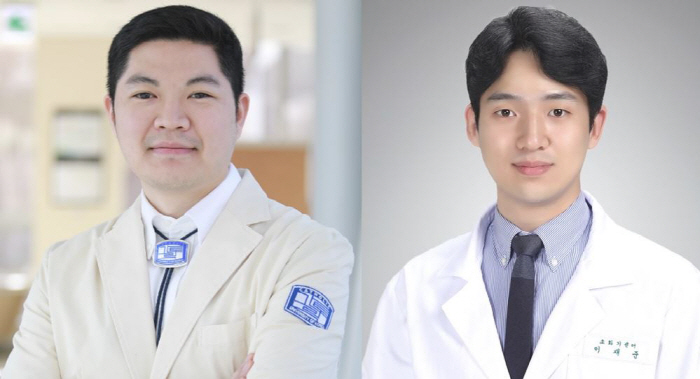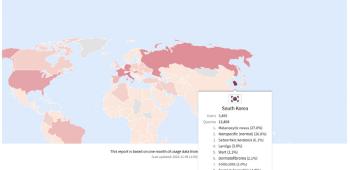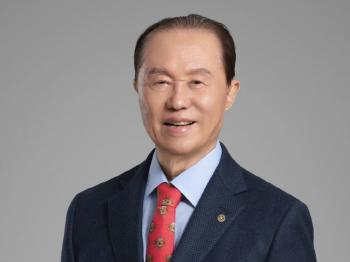Immune anticancer drug treatment failure Progressive hepatocellular carcinoma improves survival rate with classical treatment
Apr 22, 2025
Two international academic journals have found that it is effective to apply classical treatments to patients with advanced liver cancer who are not effective even in the latest immune anticancer drugs.
Hepatic arterial infusion chemotherapy (HAIC) using classical cytotoxic anticancer drugs can be an effective second-line treatment strategy for patients with hepatocellular carcinoma who have failed combination therapy of atezolizumab and bevacizumab, an immuno-oncology drug used as the first-line treatment for advanced liver cancer that cannot be surgically resected.
Hepatic artery anticancer injection uses classical cytotoxic anticancer drugs, but it is known to be effective in reducing tumors inside the liver while minimizing systemic side effects by injecting anticancer drugs directly into the tumor site through the hepatic artery.
Recently, immuno-oncology-based treatment has dramatically improved the survival rate of advanced liver cancer patients and has become a standard for first-line treatment, but if first-line treatment fails, a clear second-line treatment standard strategy has not yet been established. This study is evaluated as an important achievement of domestic researchers who can fill the treatment gap after immuno-oncology amid the change in the treatment paradigm for advanced liver cancer patients.
The research team of Sung Pil-soo, a professor of gastroenterology at Seoul St. Mary's Hospital of Catholic University, and Lee Jae-joon, a professor of gastroenterology at Eunpyeong St. Mary's Hospital, compared and analyzed 100 patients with advanced liver cancer with those who had undergone classic hepatic arterial chemotherapy from the beginning.
As a result, the patient group who underwent hepatic artery chemotherapy after treatment with combination therapy had a significantly higher objective response rate than those who underwent chemotherapy alone, and progression-free survival and overall survival tended to improve.
The study suggested that the therapeutic effect can be maximized through the process of exposing tumor antigens and inducing immunogenic cell death (ICD) as immune cells activated by immuno-cancer drug combination therapy go through chemotherapy.
Professor Seong Pil-soo of Seoul St. Mary's Hospital emphasized that "hepatic artery anticancer injection can be an important alternative in the current lack of second-line treatment strategies established after the first-line combination of immuno-cancer drugs in advanced liver cancer treatment.".
Professor Lee Jae-joon of Eunpyeong St. Mary's Hospital said, "Hepatic artery anticancer injection is an active treatment in East Asia and is mainly performed in Seoul St. Mary's Hospital and Eunpyeong St. Mary's Hospital in Korea."This study demonstrates that hepatic arterial chemotherapy can be an important alternative in establishing a patient-specific second-line treatment strategy after immuno-oncology combination therapy."
The results of the two studies were recently published in the international journals Frontiers in Oncology and Abdominal Radiology, respectively.
Hepatic arterial infusion chemotherapy (HAIC) using classical cytotoxic anticancer drugs can be an effective second-line treatment strategy for patients with hepatocellular carcinoma who have failed combination therapy of atezolizumab and bevacizumab, an immuno-oncology drug used as the first-line treatment for advanced liver cancer that cannot be surgically resected.
Hepatic artery anticancer injection uses classical cytotoxic anticancer drugs, but it is known to be effective in reducing tumors inside the liver while minimizing systemic side effects by injecting anticancer drugs directly into the tumor site through the hepatic artery.
Recently, immuno-oncology-based treatment has dramatically improved the survival rate of advanced liver cancer patients and has become a standard for first-line treatment, but if first-line treatment fails, a clear second-line treatment standard strategy has not yet been established. This study is evaluated as an important achievement of domestic researchers who can fill the treatment gap after immuno-oncology amid the change in the treatment paradigm for advanced liver cancer patients.
The research team of Sung Pil-soo, a professor of gastroenterology at Seoul St. Mary's Hospital of Catholic University, and Lee Jae-joon, a professor of gastroenterology at Eunpyeong St. Mary's Hospital, compared and analyzed 100 patients with advanced liver cancer with those who had undergone classic hepatic arterial chemotherapy from the beginning.
As a result, the patient group who underwent hepatic artery chemotherapy after treatment with combination therapy had a significantly higher objective response rate than those who underwent chemotherapy alone, and progression-free survival and overall survival tended to improve.
The study suggested that the therapeutic effect can be maximized through the process of exposing tumor antigens and inducing immunogenic cell death (ICD) as immune cells activated by immuno-cancer drug combination therapy go through chemotherapy.
Professor Seong Pil-soo of Seoul St. Mary's Hospital emphasized that "hepatic artery anticancer injection can be an important alternative in the current lack of second-line treatment strategies established after the first-line combination of immuno-cancer drugs in advanced liver cancer treatment.".
Professor Lee Jae-joon of Eunpyeong St. Mary's Hospital said, "Hepatic artery anticancer injection is an active treatment in East Asia and is mainly performed in Seoul St. Mary's Hospital and Eunpyeong St. Mary's Hospital in Korea."This study demonstrates that hepatic arterial chemotherapy can be an important alternative in establishing a patient-specific second-line treatment strategy after immuno-oncology combination therapy."
The results of the two studies were recently published in the international journals Frontiers in Oncology and Abdominal Radiology, respectively.
|
This article was translated by Naver AI translator.














